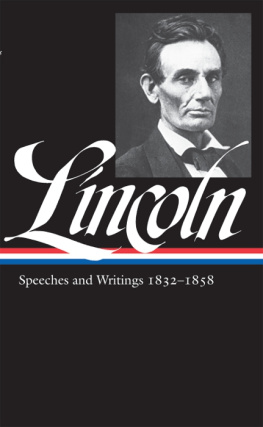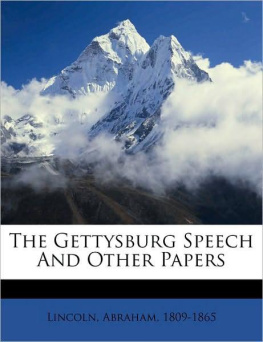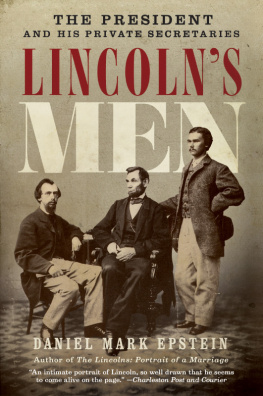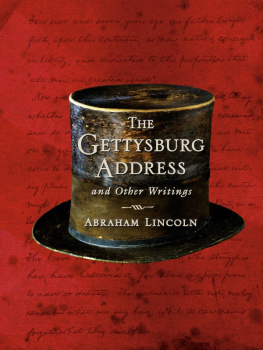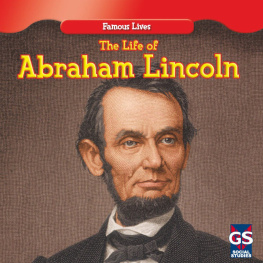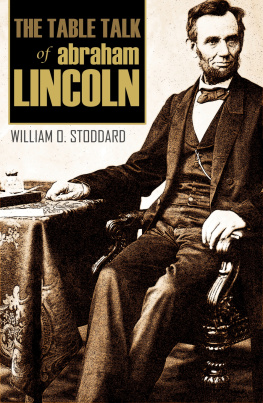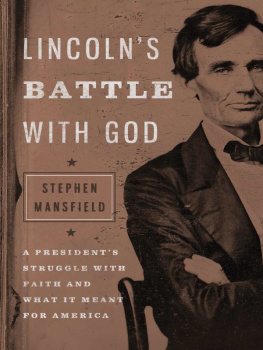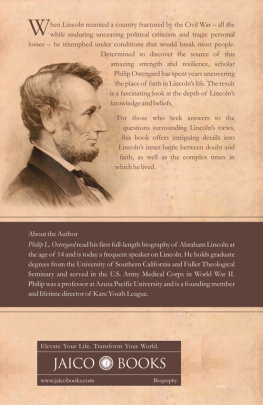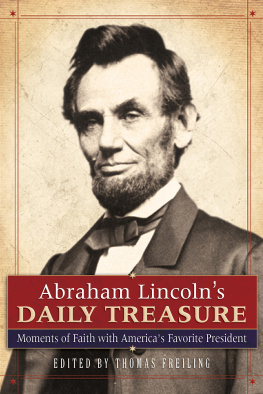This edition is published by Papamoa Press www.pp-publishing.com
To join our mailing list for new titles or for issues with our books papamoapress@gmail.com
Or on Facebook
Text originally published in 1957 under the same title.
Papamoa Press 2017, all rights reserved. No part of this publication may be reproduced, stored in a retrieval system or transmitted by any means, electrical, mechanical or otherwise without the written permission of the copyright holder.
Publishers Note
Although in most cases we have retained the Authors original spelling and grammar to authentically reproduce the work of the Author and the original intent of such material, some additional notes and clarifications have been added for the modern readers benefit.
We have also made every effort to include all maps and illustrations of the original edition the limitations of formatting do not allow of including larger maps, we will upload as many of these maps as possible.
LINCOLNS DEVOTIONAL
Introduction by
Carl Sandburg
INTRODUCTION
IN DECEMBER of the year 1849, Edward Baker Lincoln, the second of the Lincoln boys, was struck down with illness. It may have been diphtheria. No records of the exact nature of the sickness exist. After fifty-two days of waiting and fear, on the first day of February, Abraham Lincoln held in his arms the white still body of a child of his own. He could call the name of Eddie to his boy, and the boy had no ears to hear nor breath to answer.
This was his own kith and kin, who had come out of silence and gone back to silence, back where Nancy Hanks had gone the year he helped his father peg together a plank coffin. He tried to pierce through into regions of that silence, and find replies to questions that surged in him.
On the day that Eddie was buried, a funeral sermon was pronounced by the Reverend James Smith of the First Presbyterian Church of Springfield, Illinois, and a friendship developed between the Lincoln family and Mr. Smith. The minister had been a wild boy in his young days in Scotland, had been a scoffer at religion, and then had become a preacher in Kentucky. He could tell a storyhe and Lincoln were good company. A good story, said Lincoln, is medicine to my bones.
It wasnt long after Eddies death that the Lincolns rented a pew in the church. In 1852 Mrs. Lincoln took the sacrament and joined in membership. Pastor Smith presented Lincoln with a copy of his book, The Christians Defense, a reply to infidels and atheists. Lincoln read the book, said he was interested, later attended revival meetings held in the church, and served in several capacities, but when asked to join the church, said he couldnt quite see it. In the same year, the Religious Tract Society of London, England, published a daily devotional titled The Believers Daily Treasure; or, Texts of Scripture Arranged for Every Day in the Year. On the title page appeared this verse from Psalm CXIX:72:
The law of thy mouth is better unto
me than thousands of gold and silver
How Abraham Lincoln acquired his copy of the devotional we do not know. In 1852 he received as a gift at least one other book concerned with religion, but there is no word to be found of The Believers Daily Treasure. It could have been a gift from Mary Lincoln; sometime after 1847, Lincoln gave her a large family Bible, and perhaps this handy, vest-pocket book was a present from her in return, one he could carry with him for occasional reading on the Old Eighth Circuit. We do know that on the inside cover of the tiny book of Scripture and verse, Lincoln signed his name with typical abbreviation. And from this we can surmise that either the volume itself or the person who presented it to him was held in deep regard, for throughout his life Lincoln was sparing in the number of books in which he wrote his name. His signature, it would seem, was inscribed more as an expression of strong interest or affection than as a precaution against a books becoming lost, strayed, stolen.
From his earliest reading days as a boy, Lincoln turned the pages of the Bible, and over all the years of his life he went on with his reading of it, often quoting from it in private conversations and public addresses. He and his family owned several Bibles. Writing to Mary, the sister of his best friend, Joshua Speed, he said, Tell your mother that I have not got her present with me, but I intend to read it regularly when I return home. The gift was an Oxford Bible. In 1864 he received a beautiful Bible from a group of Negroes from Baltimore. In acknowledging the gift, Lincoln said, In regard to this great book, I have but to say it is the best gift God has given to man.
Among universal possessions of the American people are certain speeches and letters of Lincoln that are colored and in part drenched with biblical references and learning. Why did Lincoln say Four score and seven instead of the plain figure eighty-seven at the opening of his Gettysburg speech? Probably, it has been suggested, because in the Old Testament it reads most often two score instead of forty, and four score instead of eighty, In the Second Inaugural he spoke as an interpreter of the purposes of the Almighty, as a familiar of the pages of Holy Writ: The Almighty has his own purposes. Woe unto the world because of offences: For it must needs be that offences come; but woe to that man by whom the offence cometh.
In this Second Inaugural address, of biblical derivation is the expression, Let us judge not, that we be not judged. As the end of the War came into sight, and the awesome tasks of reconstruction and reconciliation loomed, Lincolns deep hearts desire was a minimum of hate. When Senator Charles Sumner of Massachusetts spoke of Jefferson DavisDo not allow him to escape the lawhe must be hangedLincoln replied calmly, Judge not, that ye be not judged Again, as Sumner later wrote of it, he pressed Lincoln with a remark that the sight of Libby Prison made it impossible to pardon the President of the Confederate States, and Lincoln repeated twice over the words, Judge not, that ye be not judged.
In his message of December 1, 1862, Lincoln told Congress of the need for action by the present and living generation, the territory of a nation, its land, being the only part which is of certain durability; and quoting from Scripture, he said: One generation passeth away, and another generation cometh, but the earth abideth forever.
In Springfield, in the year 1858, biblical in color was Lincolns address which ever thereafter was known as The House Divided speech. He quoted, A house divided against itself cannot stand, adding, I believe this Government cannot endure permanently half slave and half free. The brevity and portent of a Bible verse was there in the opening sentence of that speech: If we could first know where we are and whither we are tending, we could better judge what to do and how to do it.
The odor of true sanctity and an air of consecration past words saturates the letter of Lincoln to Mrs. Lydia Bixby of Boston, who had lost four sons in the war:
But I cannot refrain from tendering to you the consolation that may be found in the thanks of the Republic they died to save. I pray that our Heavenly Father may assuage the anguish of your bereavement, and leave you only the cherished memory of the loved and lost, and the solemn pride that must be yours to have laid so costly a sacrifice upon the altar of Freedom.




